In the ever-evolving world of nutrition, the debate over the effectiveness of high protein vs keto diets has grown more prominent, especially among those aiming for sustainable long-term health. Both approaches have amassed loyal followings and clinical interest, yet they differ dramatically in their mechanisms, macronutrient profiles, and impacts on various physiological systems. As more individuals seek evidence-based pathways to vitality, cognitive clarity, and metabolic resilience, understanding how these two dietary paradigms affect the body over time becomes increasingly essential.
You may also like : The Ultimate Guide to Choosing a High Protein Diet Name That Fits Your Goals
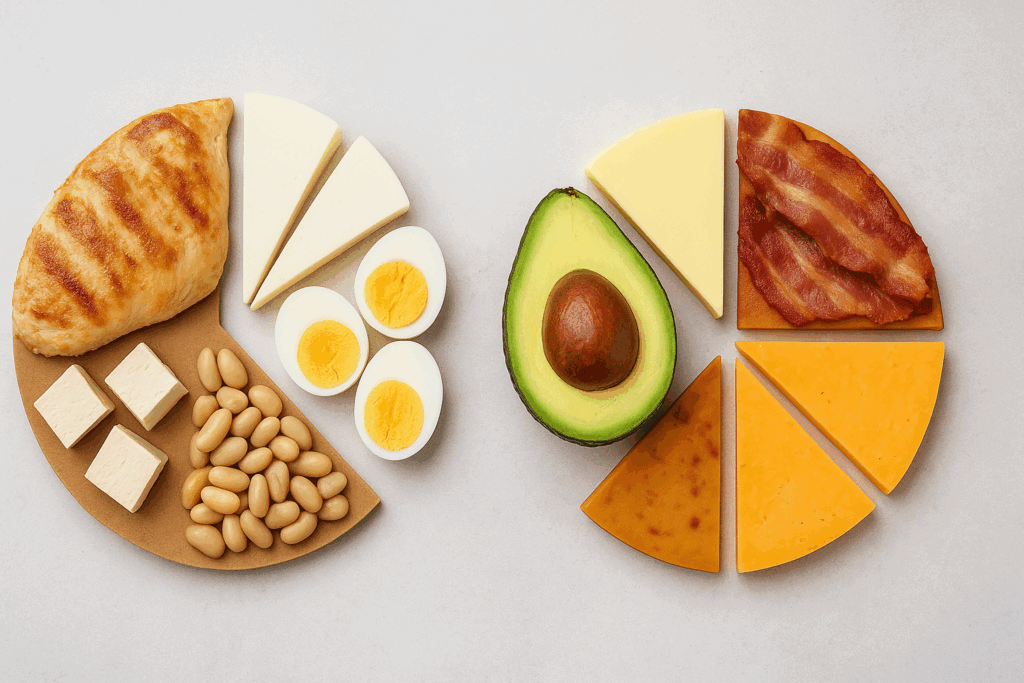
Understanding the Fundamentals of High Protein and Ketogenic Diets
To distinguish between high protein vs keto diets, one must first grasp their core principles. A high-protein diet emphasizes increased protein intake, often in the range of 25% to 35% of total daily calories, while maintaining moderate fat and carbohydrate levels. This diet supports muscle synthesis, satiety, and metabolic rate through protein’s thermogenic effect and its role in preserving lean body mass.
In contrast, the ketogenic diet drastically reduces carbohydrate intake—usually below 50 grams per day—and relies on high fat consumption (typically 70% or more of daily calories), with moderate protein levels. The goal is to induce a metabolic state called ketosis, in which the body shifts from using glucose as its primary energy source to burning fat and producing ketone bodies. This adaptation influences insulin regulation, brain metabolism, and fat storage mechanisms.
Although both diets can promote weight loss and improve metabolic markers, their differing macronutrient ratios and metabolic targets make them distinct in their long-term implications. The high protein diet capitalizes on dietary-induced thermogenesis and muscle preservation, while keto hinges on altering the body’s fuel source entirely.
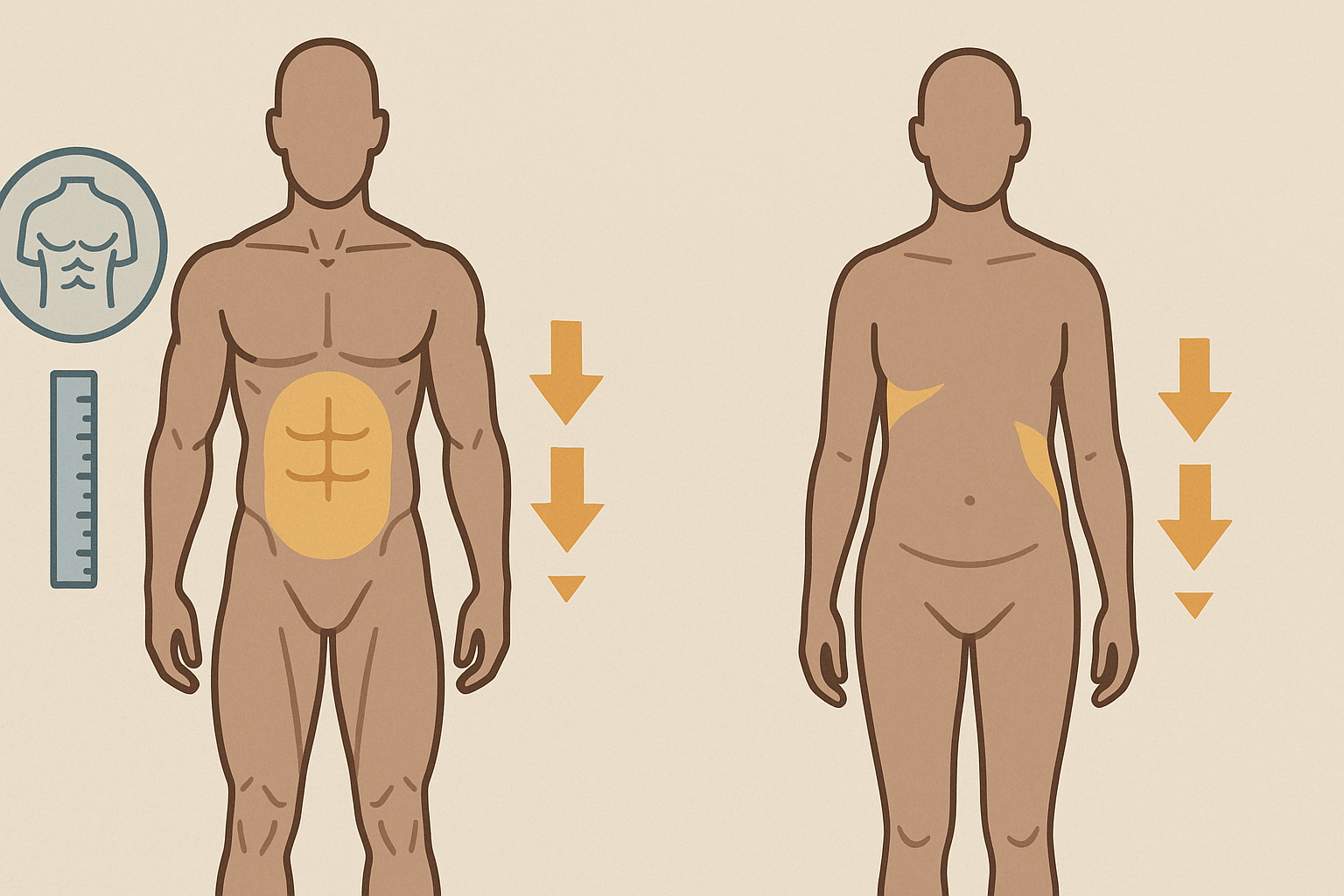
High Protein vs Keto: Weight Loss and Body Composition Outcomes
When evaluating high protein vs keto for weight loss, both demonstrate notable efficacy. High-protein diets often facilitate a greater sense of satiety, reducing overall caloric intake. Additionally, the thermogenic effect of protein means more energy is expended during digestion, contributing to a higher basal metabolic rate. Over time, this translates into not just weight loss, but a favorable shift in body composition with a higher ratio of lean mass to fat mass.
The ketogenic diet, meanwhile, can yield rapid initial weight loss due to glycogen depletion and associated water loss. Sustained ketosis encourages fat oxidation and can lead to substantial fat loss. However, the diet’s lower protein content may make it less effective for preserving muscle mass unless resistance training is incorporated diligently. Some evidence also suggests that long-term adherence to keto may lead to metabolic inflexibility, reducing the body’s ability to switch between fuel sources.
Interestingly, studies have shown that when calories and protein are matched, the differences in fat loss between high-protein and ketogenic diets narrow significantly. Therefore, individual variation and adherence may play a more pivotal role than macronutrient distribution alone. For those prioritizing muscle retention and metabolic resilience, the high-protein approach may offer more consistent advantages.
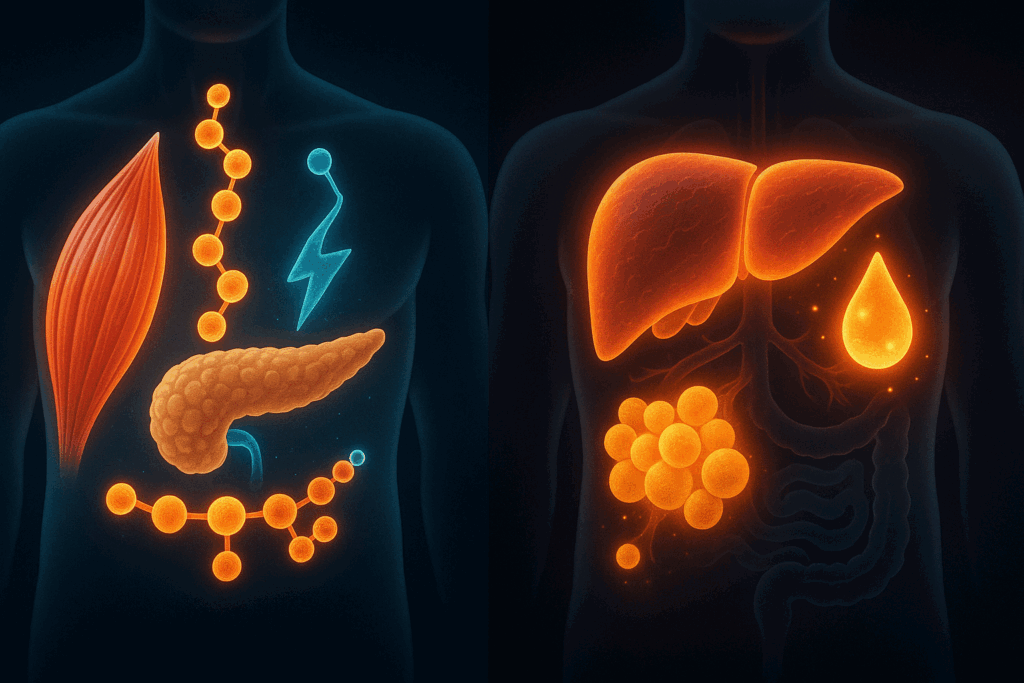
The Metabolic Landscape: High Protein and Ketosis Effects on Insulin, Glucose, and Lipids
Examining the metabolic effects of high protein and ketosis reveals important contrasts. High-protein diets tend to improve insulin sensitivity indirectly by promoting fat loss and increasing lean mass, both of which enhance glucose regulation. Additionally, protein intake stimulates glucagon release, counterbalancing insulin and preventing excessive glucose storage.
The ketogenic diet, on the other hand, directly reduces blood glucose levels by drastically limiting carbohydrate intake. This shift results in lower insulin secretion and improved glycemic control, particularly beneficial for individuals with insulin resistance or type 2 diabetes. Ketones themselves may also have insulin-sensitizing effects independent of weight loss.
However, keto’s high fat intake—especially if it includes large amounts of saturated fats—can potentially raise LDL cholesterol and affect lipid profiles negatively in some individuals. In contrast, high-protein diets, when accompanied by healthy fats and complex carbohydrates, may offer a more balanced impact on cardiovascular risk markers. Thus, the specific food sources and overall diet quality play significant roles in determining the metabolic benefits or drawbacks of each approach.
Cognitive and Neurological Impacts: Brain Health in High Protein vs Keto Approaches
One of the more intriguing comparisons in the high protein vs keto debate lies in their neurological implications. Protein-rich diets support brain health by providing amino acids essential for neurotransmitter synthesis. Tryptophan, tyrosine, and other precursors influence mood, cognitive performance, and resilience to stress. High protein intake has also been linked to reduced risk of age-related cognitive decline due to its role in maintaining muscle mass and metabolic health, which are closely tied to brain function.
The ketogenic diet, however, holds a unique place in neurological nutrition. Originally developed to treat epilepsy, keto has been shown to enhance mitochondrial function and reduce neuroinflammation. Ketone bodies serve as an efficient fuel for the brain, especially under conditions of impaired glucose metabolism, such as in Alzheimer’s disease. Emerging research even suggests potential benefits in conditions like Parkinson’s and traumatic brain injury.
Still, the long-term neurological safety of the ketogenic diet remains under investigation. While short-term studies are promising, questions linger about potential micronutrient deficiencies and the impact of sustained low glucose availability on neurotransmission. A high-protein diet, by contrast, may offer more nutritional diversity and easier long-term maintenance, potentially making it a safer bet for preserving cognitive health in the general population.
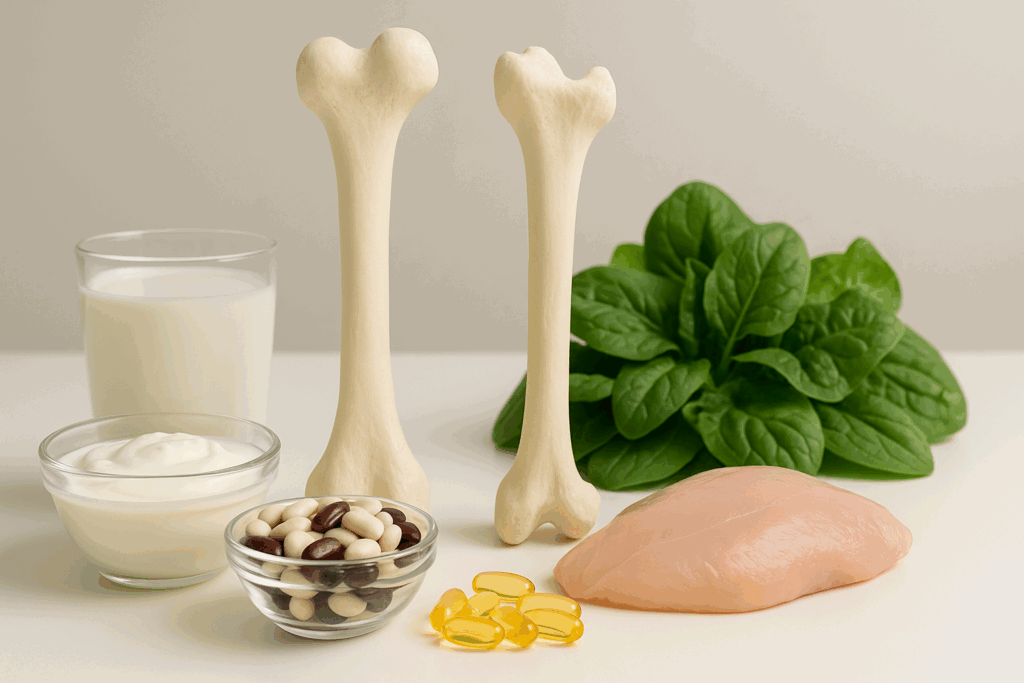
Bone Health: An Underappreciated Consideration
Bone health is often overlooked in dietary debates, yet it plays a crucial role in longevity and quality of life. There is a lingering myth that high-protein diets increase calcium loss and compromise bone density. However, modern research refutes this idea, showing that adequate protein intake is essential for bone matrix formation and maintenance. When paired with sufficient calcium and vitamin D, protein actually supports skeletal strength.
The ketogenic diet, especially when lacking in mineral-rich plant foods, may pose greater risks to bone health. A study published in Frontiers in Endocrinology found that long-term keto adherence in epileptic children resulted in reduced bone mineral density. While these effects are more pronounced in extreme clinical applications, they raise important questions about the diet’s safety for the general population.
High-protein diets, when balanced with vegetables, dairy, and legumes, offer a more robust nutritional profile for preserving bone integrity. They also support muscle mass, which is directly correlated with bone density due to mechanical loading and hormonal synergy.
Cardiovascular Health and Lipid Markers: A Delicate Balance
Cardiovascular implications are central to the debate between high protein and ketosis-oriented diets. High-protein diets, when focused on lean meats, fish, legumes, and plant-based proteins, often correlate with improved lipid profiles and reduced blood pressure. They tend to lower triglycerides and raise HDL cholesterol while keeping LDL levels in check, particularly when saturated fat intake is moderated.
Keto’s impact on cardiovascular health is more controversial. While some individuals experience improved HDL and triglyceride levels on a well-formulated ketogenic diet, others see a rise in LDL cholesterol and ApoB—a marker of atherogenic risk. The type of fat consumed significantly influences these outcomes. Diets high in monounsaturated and polyunsaturated fats generally confer more cardiovascular benefits than those high in saturated fats.
Furthermore, the exclusion of fiber-rich foods in many keto regimens may reduce protective compounds like antioxidants and plant sterols. High-protein diets, especially those incorporating whole grains, legumes, and vegetables, provide greater access to these nutrients. From a heart health standpoint, the high-protein model may offer more flexibility and a broader margin of safety over the long term.
Sex-Based Differences in Diet Response
Emerging research underscores that men and women may respond differently to high protein vs keto diets due to hormonal and physiological differences. Men often experience more significant improvements in insulin sensitivity and body composition on keto diets, especially if they carry excess visceral fat. Women, on the other hand, may face hormonal disruptions with strict keto plans, particularly those involving low total caloric intake.
For premenopausal women, carbohydrate restriction can interfere with estrogen production, ovulation, and thyroid function. Some women report menstrual irregularities and fatigue when following strict keto regimens, especially without adequate micronutrient support. High-protein diets with moderate carbs appear to be better tolerated and more hormonally supportive in these cases.
Postmenopausal women, whose estrogen levels are already lower, may benefit from high-protein intake to counteract sarcopenia and maintain metabolic health. While some may adapt to a cyclical or modified keto approach, the high-protein model generally aligns more closely with their physiological needs.

Sustainability and Adherence: Which Diet Is Easier to Maintain Long-Term?
One of the most critical yet underappreciated factors in determining dietary effectiveness is sustainability. A diet’s success hinges not just on short-term outcomes but on its ability to be maintained for years. In this context, high protein vs keto diets diverge considerably in their practical application.
High-protein diets are generally more adaptable to diverse cultural and culinary traditions. They allow for moderate carbohydrate inclusion, making them compatible with fruits, legumes, whole grains, and even occasional indulgences. This flexibility enhances social engagement and long-term satisfaction, reducing the risk of dietary fatigue.
Keto, by contrast, requires strict carbohydrate restriction to maintain ketosis, which can be challenging over time. Dining out, social gatherings, and travel often become sources of stress for keto adherents due to limited food choices. Moreover, the potential for nutrient deficiencies increases if the diet is not meticulously planned.
Behavioral studies consistently show higher dropout rates in low-carb, high-fat diets compared to more balanced high-protein approaches. The psychological burden of constant restriction and the physiological adaptation required to maintain ketosis may undermine long-term adherence. Therefore, from a sustainability standpoint, high-protein diets generally hold a distinct advantage.
Environmental and Ethical Considerations
Sustainability and ethics have become pivotal themes in nutrition, influencing public discourse and dietary choices. High-protein diets often raise concerns about the environmental impact of animal agriculture, particularly beef and dairy. However, not all protein sources are created equal. Sustainable protein can be sourced from poultry, fish, legumes, tofu, tempeh, and even lab-grown or insect-based alternatives.
Keto diets may also pose sustainability challenges due to their reliance on high-fat animal products. Moreover, the limited variety in plant-based foods on a strict keto plan reduces the feasibility of locally-sourced and seasonal eating patterns. For environmentally conscious individuals, a high-protein diet that emphasizes plant-forward principles offers a more ethical and sustainable path.
Additionally, socioeconomic factors must be considered. Keto-friendly foods such as grass-fed meats, specialty oils, and low-carb alternatives can be prohibitively expensive. High-protein diets, especially those that include legumes, eggs, and poultry, are more accessible and budget-friendly, supporting wider public health implementation.
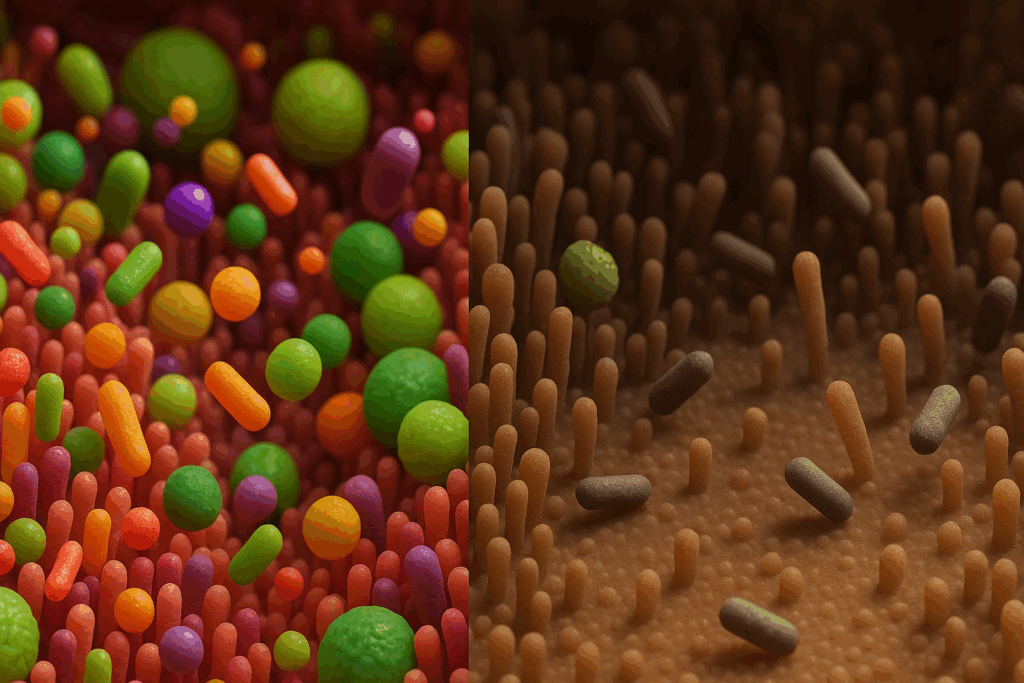
Gut Health and Microbiome Considerations in High Protein vs Keto Diets
The role of gut health in overall wellness has gained increasing recognition, adding another dimension to the high protein vs keto conversation. Diets rich in fiber and plant diversity support a robust and balanced gut microbiome, which in turn influences immune function, mood, and metabolic health.
High-protein diets, especially those that incorporate plant-based proteins and fiber-rich foods, tend to promote microbial diversity. Legumes, vegetables, nuts, and whole grains provide prebiotic fibers that nourish beneficial gut bacteria. Even animal-based proteins, when consumed moderately and accompanied by diverse produce, support gut health without adverse effects.
Conversely, many versions of the ketogenic diet are low in fermentable fibers due to the restriction of fruits, legumes, and grains. This can lead to a reduction in short-chain fatty acid production, such as butyrate, which plays a critical role in gut lining integrity and inflammation control. Additionally, some studies suggest that prolonged ketosis may favor the growth of less beneficial microbial strains, potentially compromising long-term gut health.
While targeted strategies can mitigate these effects—such as incorporating low-carb vegetables and fermented foods into a keto plan—they require advanced knowledge and constant vigilance. In contrast, a well-structured high-protein diet naturally lends itself to better gut health outcomes with less effort.
Immune System Interactions and Inflammatory Modulation
Another frontier in the high protein vs keto discussion is their respective impacts on immune function and inflammation. High-protein diets rich in antioxidants, polyphenols, and prebiotic fibers foster a well-regulated immune system. This combination strengthens mucosal immunity, supports gut-associated lymphoid tissue (GALT), and helps regulate pro-inflammatory cytokines.
Keto diets may reduce systemic inflammation by decreasing blood glucose and insulin levels, which in turn lower oxidative stress. Additionally, ketone bodies like beta-hydroxybutyrate (BHB) have anti-inflammatory properties. However, this effect is context-dependent. In poorly formulated keto diets, especially those high in processed meats or trans fats, inflammation may increase rather than subside.
The long-term immune resilience afforded by high-protein diets, particularly those that include plant diversity, is well-supported by immunological literature. They nourish both innate and adaptive immunity through a more varied nutrient profile and favorable gut microbiota composition. For those with autoimmune conditions or chronic inflammatory diseases, an anti-inflammatory high-protein diet may offer a more sustainable advantage.
Psychological and Behavioral Dynamics: Dieting Mindsets and Emotional Health
Psychological well-being is an essential component of dietary success, yet it is frequently overlooked in clinical trials. Diets that demand constant vigilance or strict compliance can increase anxiety, promote disordered eating behaviors, and reduce overall quality of life. The restrictive nature of keto diets—with their ban on most fruits, grains, and starchy vegetables—can trigger food obsession or social withdrawal in some individuals.
High-protein diets, with their broader food options, tend to foster a healthier relationship with eating. They align more closely with intuitive eating principles, supporting mindfulness, satisfaction, and emotional stability. The ability to incorporate favorite meals or enjoy shared culinary experiences without derailing progress adds psychological resilience.
Moreover, the neurotransmitter support provided by adequate protein intake—via amino acids such as tryptophan and tyrosine—can help regulate mood and reduce symptoms of depression or anxiety. These biochemical advantages, combined with social inclusivity, make high-protein plans more psychologically sustainable for the average person.
High Protein vs Keto for Athletic Performance and Muscle Maintenance
When evaluating high protein vs keto from the lens of athletic performance and muscle preservation, several factors must be considered. Protein is the cornerstone of muscle repair and growth, making high-protein diets especially favorable for athletes, resistance trainers, and aging adults aiming to preserve lean mass.
Increased protein intake supports muscle protein synthesis, enhances recovery, and contributes to strength gains. Carbohydrates, which are often more accessible in high-protein diets, also play a vital role in replenishing glycogen stores and sustaining high-intensity training.
The ketogenic diet, while effective for fat adaptation in endurance sports, may compromise anaerobic performance due to limited glycogen availability. Some athletes adapt to keto with time, experiencing improved fat utilization, but performance in explosive or strength-based disciplines often suffers. Additionally, moderate protein levels in keto diets may not suffice for optimal muscle maintenance without precise planning.
Ultimately, athletes or individuals engaged in regular high-intensity exercise may find high-protein diets more conducive to their goals. The broader range of fuel sources and nutrient accessibility supports both performance and recovery, making it a more holistic approach for physically active populations.
Ketogenic Diets in Medical Therapy: Special Considerations and Cautions
Despite criticisms, the ketogenic diet retains a respected place in therapeutic nutrition. It remains the gold standard for drug-resistant epilepsy and shows promise in certain cancers, neurodegenerative diseases, and metabolic syndromes. For individuals under medical supervision, therapeutic keto can be life-changing.
However, these cases are highly specific and should not be generalized to the broader population. The therapeutic mechanisms of keto—including mitochondrial biogenesis and altered signaling pathways—must be weighed against risks such as nutritional deficiencies, hepatic stress, and decreased bone density.
Long-term unsupervised keto use, especially without comprehensive lab monitoring, can mask underlying issues or create new imbalances. In contrast, high-protein diets do not require the same level of clinical oversight, making them safer and more practical for general wellness goals.
Nutritional Diversity and Micronutrient Sufficiency: Broader Benefits of High Protein Diets
Nutritional adequacy is a key pillar of long-term health, and here the high protein vs keto comparison yields important insights. A diverse high-protein diet that includes animal and plant sources, fruits, vegetables, and whole grains ensures a broad intake of essential vitamins, minerals, and phytonutrients.
Keto diets, by necessity, limit many nutrient-dense foods, potentially reducing intake of vitamin C, potassium, magnesium, and certain B vitamins. While supplementation can help address these gaps, it does not replicate the synergistic benefits of whole food sources. Additionally, the exclusion of antioxidant-rich fruits and legumes may diminish the body’s ability to combat oxidative stress over time.
By embracing a wide array of food groups, high-protein diets foster a more balanced and protective nutritional profile. This diversity supports immune resilience, cellular repair, and hormonal balance, contributing to long-term health beyond macronutrient composition alone. Those seeking sustainable vitality and disease prevention may benefit more from the inclusive nature of a high-protein regimen.
Emerging Trends: Personalized Nutrition and Hybrid Approaches
As nutritional science evolves, the idea that one-size-fits-all diets are outdated has gained traction. Genetic polymorphisms, gut microbiome profiles, and lifestyle factors significantly influence diet efficacy. Personalized nutrition, which tailors macronutrient intake to individual needs, is the future of dietary planning.
In this context, hybrid models that borrow elements from both high-protein and keto strategies are gaining popularity. For example, targeted ketogenic diets (TKD) that allow carbohydrates around workouts, or high-protein ketogenic diets (HPKD), offer middle-ground solutions. These approaches provide the metabolic benefits of ketosis with improved muscle preservation and nutrient density.
Such hybridization underscores the value of flexibility and self-awareness. Individuals may thrive on different dietary compositions at various life stages or health conditions. The key is to maintain a dynamic approach grounded in evidence, self-monitoring, and professional guidance.
Frequently Asked Questions: High Protein vs Keto
1. How do social dynamics influence success on high protein vs keto diets?
Social support and social settings significantly influence dietary adherence and overall success. High-protein diets are generally more compatible with social events, cultural norms, and family meals due to their flexible inclusion of a wide variety of foods. This flexibility makes it easier for individuals to dine out, travel, or attend celebrations without derailing their progress. In contrast, keto’s stringent carbohydrate limitations can create tension in social situations, leading to feelings of isolation or increased anxiety around food choices. People who thrive on routine and structured environments may find keto more manageable, but for those with active social lives, a high-protein approach tends to offer greater psychological comfort and sustainability.
2. Can high protein and ketosis coexist in a single dietary strategy?
While traditionally distinct, high protein and ketosis can overlap under specific conditions. A high-protein ketogenic diet (HPKD) modifies the standard keto approach by increasing protein intake while still restricting carbohydrates enough to maintain ketosis. However, too much protein may kick some individuals out of ketosis due to gluconeogenesis, where excess protein is converted into glucose. Therefore, this hybrid approach requires careful monitoring and may work best for individuals who are physically active or using keto for therapeutic reasons. When executed correctly, high protein and ketosis can complement each other, balancing muscle preservation with metabolic fat adaptation.
3. What are the long-term implications of high protein vs keto diets on liver and kidney health?
Concerns about liver and kidney health often arise in discussions of high protein vs keto, yet evidence suggests these fears are largely unfounded for individuals with normal organ function. High-protein diets do increase the metabolic load on kidneys, but studies have consistently shown no adverse effects in healthy individuals. Likewise, keto can initially strain the liver due to the shift in energy metabolism, but this effect tends to normalize after the adaptation phase. That said, those with preexisting kidney disease should consult a healthcare provider before increasing protein, and people with liver conditions should approach keto with caution. Regular monitoring of liver enzymes and kidney markers is advisable for anyone engaging in long-term restrictive diets.
4. How do high protein vs keto diets affect sleep quality and circadian rhythms?
Sleep patterns are closely tied to dietary intake, and both high protein and keto diets can influence circadian rhythms in unique ways. High-protein diets, especially when protein is consumed at dinner, can enhance serotonin production and improve sleep latency. On the other hand, keto can initially disrupt sleep due to the metabolic shift into ketosis, often causing vivid dreams or nocturnal awakenings. Over time, some individuals report deeper sleep on keto once adaptation occurs, potentially linked to stabilized blood sugar levels and reduced nighttime hunger. However, insufficient carbohydrate intake can reduce REM sleep and melatonin synthesis in certain individuals. Balancing macronutrients with one’s natural chronotype may improve sleep quality across either dietary model.
5. Is there a difference in how high protein vs keto diets affect women during perimenopause?
During perimenopause, women experience hormonal fluctuations that affect metabolism, fat distribution, and energy levels. High-protein diets support lean mass maintenance and offer steady blood sugar control, which can mitigate mood swings and energy crashes. Keto, while effective for some, can disrupt thyroid and reproductive hormones if carbohydrates are too low, exacerbating perimenopausal symptoms such as fatigue or menstrual irregularities. Women often fare better with a cyclical ketogenic approach, incorporating higher-carb days or moderate-carb periods to preserve hormonal balance. High-protein strategies that include plant-based fibers and phytoestrogens may also support estrogen modulation, offering a smoother transition during this life stage.
6. What impact do high protein and ketosis have on cognitive performance under stress?
Under acute or chronic stress, the brain requires efficient and stable fuel to maintain optimal performance. High-protein diets supply ample amino acids like tyrosine and tryptophan that serve as precursors for dopamine and serotonin, both crucial for mood regulation and focus. Ketogenic diets, meanwhile, provide ketones like beta-hydroxybutyrate, which serve as an alternative energy source that may enhance cognitive resilience during metabolic stress. However, the brain’s adaptability to ketones can vary based on genetic and lifestyle factors. In high-stress professions or situations requiring rapid cognitive shifts, high-protein diets may offer more consistent support due to their flexibility and immediate availability of glucose when needed.
7. How do athletic recovery and inflammation differ on high protein vs keto diets?
Athletes often seek dietary strategies that optimize recovery and minimize inflammation, two areas where high protein vs keto show distinct profiles. High-protein diets accelerate muscle repair through amino acid availability, particularly branched-chain amino acids like leucine. They also promote quicker glycogen restoration when paired with moderate carbs. Keto may reduce chronic inflammation through ketone signaling pathways, but its limited carbohydrate intake can impair acute recovery from high-intensity or anaerobic training. Some athletes use keto during off-seasons or low-intensity training blocks and switch to higher-protein, carb-inclusive regimens during competitive periods. Thus, recovery and inflammation management depend on aligning diet with training cycles.
8. Are there unique microbiome shifts associated with high protein vs keto diets?
The gut microbiome responds dynamically to dietary inputs, and both high protein and ketosis create distinct microbial environments. High-protein diets that include diverse fiber sources encourage the growth of beneficial bacteria like Bifidobacteria and Lactobacilli, which support immunity and gut barrier integrity. Keto, especially when fiber intake is low, may reduce microbial diversity and increase species linked with dysbiosis if not carefully balanced. However, the ketogenic state itself can suppress pathogenic bacteria by altering gut pH and bile acid production. For optimal microbiome health, integrating fermented foods, prebiotic fibers, and polyphenols is essential in both dietary frameworks.
9. How can someone safely transition between high protein and ketogenic diets?
Transitioning between high protein and ketosis should be done gradually to minimize metabolic stress and side effects. For those moving from high-protein to keto, reducing carbohydrate intake slowly over several weeks allows for smoother entry into ketosis without triggering fatigue or cognitive fog. Increasing dietary fats while moderating protein can facilitate ketone production. Conversely, transitioning from keto to high-protein involves reintroducing carbohydrates strategically to avoid blood sugar spikes. Starting with complex carbs like lentils, oats, and root vegetables can support a steady glycemic response. In both cases, electrolyte management, hydration, and digestive enzyme support are critical for comfort and success.
10. What does the future hold for high protein vs keto diets in personalized nutrition?
As personalized nutrition gains traction, the high protein vs keto debate is likely to evolve into more fluid, hybridized models. Emerging technologies like microbiome sequencing, genetic testing, and metabolomics will help tailor macronutrient ratios to individual needs with greater precision. High-protein plans may be optimized based on muscle mass, metabolic rate, and hormonal profiles, while keto strategies could be personalized for neuroprotection or metabolic dysfunction. AI-driven meal planning and wearable health tech will further refine how people interact with their diets in real time. Ultimately, the future lies not in choosing between high protein and ketosis, but in intelligently integrating their principles based on evolving personal health data and goals.
Conclusion : The Long-Term Health Edge of High Protein vs Keto
While both high protein and ketogenic diets can offer powerful short-term benefits for weight loss, metabolic health, and even neurological function, the long-term landscape favors the high-protein approach for most individuals. The comparative flexibility, broader nutritional scope, and ease of adherence make it a more sustainable and protective choice for lifelong wellness.
The surprising truth about high protein vs keto lies in their contrasting ability to support not just fat loss, but total health optimization. High protein diets align more naturally with human physiology, activity patterns, and social eating environments. They allow for a wider spectrum of whole foods, encourage muscle preservation, and promote gut and cardiovascular health without requiring extreme restriction or constant monitoring.
For those navigating the path toward long-term vitality, cognitive sharpness, and physical resilience, a well-balanced high-protein diet offers an evidence-backed, adaptable, and nutritionally complete solution. While ketogenic strategies may serve as powerful tools in specific clinical contexts or for short-term objectives, the high-protein model emerges as a more holistic framework for enduring health and well-being.
Further Reading:
The Ideal Protein Diet vs. the Ketogenic (Keto) Diet: What’s the Difference?





